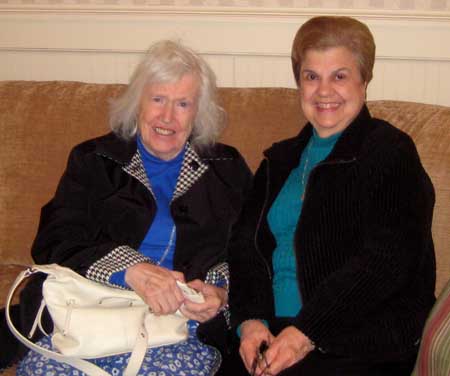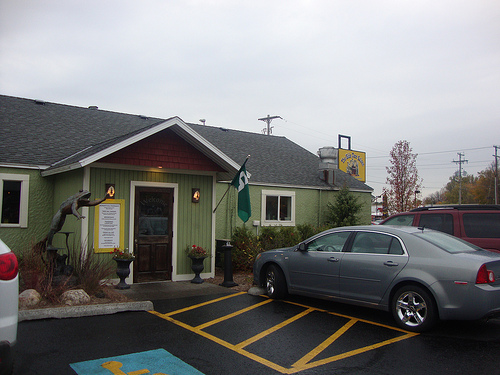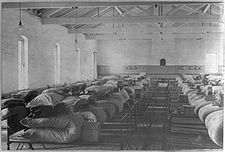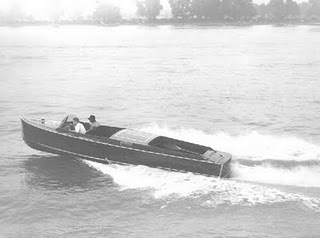The Vermettes of River Rouge

(Magpie and Dee at Potemkin Village. They have eight children between them, and happy Mother’s Day! Photo Socotra.)
It is Mother’s Day, and I got up earlier than the northern Michigan dawn to get m crap out of the way before dealing with that of the folks. I have to do the brunch at the Country Club with Raven and magpie. Yesterday, I was lucky. I had help with the logistics of getting them out of the Village and into the bracing northern air.
Dee came up, and helped keep things organized. She is a wonderful woman, but exactly how wonderful I didn’t know.
I was reading the account of the discovery of Air France Flight 447 with a certain morbid fascination in the New York Times magazine this morning. If you travel a lot, or even a little, there is something about the random zap the universe can throw you, killing without warning, only providing a moment of stark terror before slamming you into eternity.
That is why Dee’s story- well one of them- resonated so strongly this morning. See, she is one of the Greatest Generation, though a little young for it. She and her older sister heard the news about VJ Day and took a bus from River Rouge to downtown Detroit and spent the day hanging out in the lobby of the Book-Cadillac Hotel, watching the madness and joy of the victory celebration.

(The Side Door Saloon. Raven’s men’s group used to lunch there every week, and I hoped it would stimulate him. It didn’t, as best I could tell.)
She lost a brother to the war, or at least to cruel fate, and that was just one of the wonders I re-discovered it at the table of the Side Door Saloon on the north side of town when we took Raven and Magpie to lunch.
The outing was a full-on production number. They had not been out in a while, and Dee made the long journey up from Torch Lake to see them. She is a bit younger, still full of vim and vigor. Her husband Bob was a force of nature of a man, so it was not unusual to see him as the focus of the clan, but let me tell you I was floored with Dee’s story.
With the folks the way they are, we carried the conversion. Magpie can chat away with us, but the conversation is disjointed and can veer off in unknown directions. Not so with Dee. She is focused.

(Sign from Cliff Bell’s hotspot. Photo Bell’s.)
It was good to have another grown-up to talk to, someone present both in this moment and others. She had e-mailed me about going to Cliff Bell’s hot nightclub on Park Street, just off Grand Circus Park in Detroit. It was one of the happening places in Old Detroit, and is one of those places in the problematic re-invention of the Motor City.
I walked by there the other day, marveling at what might or might not be happening amid the ruins of the city, and I did the research to put the place in context.
“Cliff Bell was a bootlegger, before he was a celebrity showman,” I said. “He ran a wet spot as an annex to the Detroit Athletic Club, which was officially dry, but the members would slip over to Cliff’s annex to get soused.”
“Oh my, yes. He had to close that place and open something lower key when the DAC got too high profile. All the important people- car guys and Judges- belonged. A lot of people were in the business.”
“I heard it was like one-in-four people in Detroit were in the booze business.”
“That seems reasonable. Daddy was.”
I was trying to get a spoon of chili into Raven’s mouth and I turned in amazement.
“What?”
“Oh, yes. Daddy went to Leavenworth for a year-and-a day for it. He was convicted of trying to bribe the FBI.”
“Holy smokes,” I said. “Tell me about it.”
“I should write a book,” said Dee. “Can I cut your burger in half and give some to your husband,” she said to Magpie. Mom nodded, and she deftly cut the world-famous oliveburger and we navigated the slice over to Raven, who held it on a napkin, puzzling over what to do with it.
“Daddy’s name was Ernie- Earnest Vermette. He was a bootlegger and an autoworker and a ship-builder, and after he retired he was a bank-guard with a uniform and a gun. He used to joke that his stretch in Leavenworth was so long ago that no one thought to check on whether he was a convicted felon.”
“Vermette sounds French,” I said. Did they immigrate to Detroit?”
“No, the Vermettes came from Frenchtown. I am not sure where it was, exactly, but around Monroe someplace. He moved to River Rouge with his brother and cousins. Uncle Frank never worked an honest day in his life.”
“Wait a minute. Your Dad was descended from the original French population of Michigan? I had no idea they were still around.”
“Oh, sure. My grandparents didn’t speak English, only French around the house. That is why Daddy had a tough time when they moved- he didn’t know English.”
“This is incredible,” I said, watching the equally incredible sight of Raven attempting to apply a spoon to the burger in the napkin in his hands.
“There were ten children in the family. Ernie married Mom when they were still teenagers and had a baby every two years. There were six brothers and the four of us girls.”
“What were their names? I said. “I need a pen!”
Dee smiled placidly. “Arnold, Dale, Eugene, Bob and Ray. Bob and Ray were in the War. Bob was in Europe with the Air Corp and Ray was in the Navy in the Southwest Pacific. Little Jerry died when he was two, and I never met him. The girls were Virginia, Barbara and Ivadelle. She was a pistol. Uncle Joe used to dress her up and put makeup on her to ride along on the booze runs to Chicago. She was only twelve, but she could pass for older, and seeing a couple in the car made the police less suspect.”
“Good God, that is amazing.”
“Ivadelle always said Uncle Joe paid really well. Momma had four boys in a row, and my older sister threatened to get rid of the baby if I had turned out to be a boy. She wouldn’t believe I as a girl until they looked under my diaper. We were very close. She was 17 years older than me, and always took good care of me.”
“That is like Raven’s brother Jim,” I said, patting him on the knee. “He was sort of the deputy Dad for him after grandpa passed away.”
“After they arrested Daddy they asked him what he did for a living. He said he was a speedboat pilot. They put him on a train handcuffed to an FBI agent. Ernie was a skinny guy, and when the G-man fell asleep he just slipped the cuff off and stayed put. He could have run and jumped off the train, but he was determined to do his time and get back to the family. He was a good man and a great father. The boys were so afraid of him they never did anything wrong.”
“How did the family survive with their breadwinner in the slammer?”
“Oh, The boys in the network took care of us. There would be a knock on the door at two or three in the morning, and a guy would be there with his collar up and hat pulled down over his eyes and a big wad of cash would appear. We had more money when Daddy was in jail than when he was working.”
“You need to write a book,” I said in wonder.

(Leavenworth Prison dormitory a little before Ernie’s time, but still hard.)
“Oh, there a lot of stories he would tell about his time in jail. They had cockroach races, and attached cigarettes to them with twine to send them to other cells. When Daddy got to jail, everyone knew him, and there was a shout of “Hey, Ernie” from the kitchen when they saw him in the line.”
“It is hard to imagine,” I said. “I mean, that normal people got sent to jail for selling liquor.”
“We had a false floor in the garage- the neighborhood had alleys, and Mom and Dad could not travel while they were holding liquor down there. We were hijacked one time.”
“That would have been the Purple Gang,” I said. “they never smuggled their own booze. They just robbed bootleggers who brought it across the river. I can’t believe your family was ripped off by the Purples.”
Anna the waitress came by with a plate for Raven to put the partial burger on. It was a mess of bun and patty and sodden napkin. She asked if any of us wanted dessert, and we shook our heads. “Daddy never liked cherry pie,” Dee said thoughtfully.
“Why was that?”
“Well- he always called his year in Leavenworth as being in College. When he was in line at the mess hall one day, a buddy in the kitchen slipped him a whole cherry pie, and Daddy slipped it up under his shirt. One of the Guards noticed something unusual and tapped him on the stomach with his night-stick and it clanked on the tin.
“Ouch,” I said.
“The guard made him eat the whole thing right there in front of him. Daddy never liked cherry pie after that.”
“Perfectly understandable,” I said, waving to Anna for the check. “That is all sort of hard to digest. The whole story. You need to write this down.”
“I will get around to it. Maybe when I get back from Sweden.”
“It is incredible, Dee. Simply incredible. What a window into Detroit’s history.”
“Oh, there is more,” said Dee. “We lost Bob during the war, just a month before his 21st birthday.”
“Was he killed in action?” I asked.
“Well, it is sort of strange story,” she said, “but it looks like your father is getting a little antsy. I can tell you later in the car.”
“Sounds great,” I said, and started the process of getting Raven ready to get out of his chair and into his coat and hat. Like I say, it was a whole production number. Not like moving liquor across the Detroit River, but about as much as I could handle.

(Rum Runner similar to Ernie Vermette’s. Dee says he used to say the Detroit River is paved with cases of liquor.)
Copyright 2011 Vic Socotra
www.vicsocotra.com
